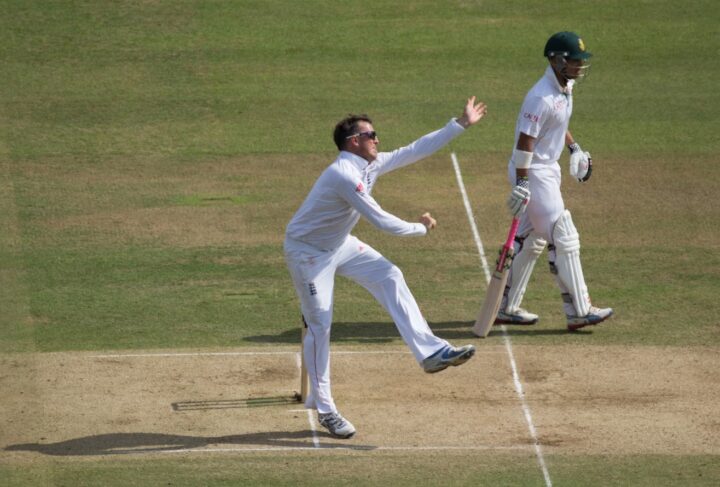First let me begin on a sympathetic note. When I heard the news that Andrew Strauss would be stepping away from the ECB for a while to look after his wife my heart sank. It must be a horrible time for him and his family. I hope this seemingly unscheduled break doesn’t mean that the prognosis has worsened. I really don’t know the details but we obviously all wish the Strauss family the best. Some things in life are more important than cricket.
I feel bad, therefore, that I feel somewhat compelled to dissect the interview Strauss gave immediately before his departure. I don’t like criticising a man when he’s down, but I found his comments on the future of English cricket a little disturbing and therefore I cannot let them go without comment – especially as they contained what I see as more empty rhetoric and that all-too-familiar management speak.
Give the interview a read. You’ll find it takes him a thousand words to say “we lose away from home because we don’t have anyone who can bowl fast or bowl mystery spin”. I can’t believe it took the ECB as long as two months and a review to reach that conclusion. I can believe, however, that it took them two months to come up with the term ‘point of difference players’. A lot of consultancy work goes into coming up with a term that naff.
What frustrated me most about this particular interview, however, is that Strauss kept saying England need to embrace ‘radical change’ to improve their test fortunes away from home. This seems a tad disingenuous to me. It positions him as someone who desperately wants to improve England’s test team but who is hamstrung by factors outside his control. Unless Strauss is the only good guy inside the ECB, and despite appearances he’s actually engaged in a power struggle against the white ball happy Harrison and Graves, then he’s not really being up front here.
The truth, of course, is that the ECB (and therefore by extension Strauss himself) are very consciously damaging first class cricket, and the only radical change on the horizon is Harrison’s Harebrained Hundred – a competition that will push the championship to the fringes of the season and therefore make it more difficult for England to improve their fortunes abroad. A plea for English first class cricket to embrace radical change therefore seems as empty as the stands at New Road, Grace Road, The Riverside etc will be when the Hundred finally kicks off.
Although Strauss talks boldly about current discussions presenting a once in a lifetime opportunity to restructure the county game for the test team’s benefit, anyone who’s been following developments closely will know that England’s ability to compete in places like India and Australia is the least of the ECB’s concerns. I imagine their biggest problem, especially if one has read George Dobell’s article on the ECB’s falling financial reserves, is to boost their coffers – which I assume is what the Hundred is all about.
The ECB’s real brief, therefore, is surely to make the Hundred as successful as possible whilst mollifying the inevitable damage it will do to the county championship and the England test team. To pretend that current discussions are focused on helping the test team, rather than cashing in on the franchise project, insults supporters’ intelligence.
If you haven’t already read the Sam Collins (of Death of A Gentleman fame) article on Cricinfo this week, I seriously suggest you give it a read. He argues that whilst introducing a new white ball format is fine in theory, the ECB’s execution has been poor to say the least. He also questions the real motives behind the new tournament, which he summarises thus:
It’s clear what The Hundred won’t do (in its current form). It won’t provide the necessary access to the free-to-air audience that the game needs to thrive. It won’t please the cricketing purists. It won’t help the English Test team (beyond allowing the board to pay its players more money). So what will it do? Make money for the ECB.
And there you have it. It’s all about money. Greed if you like. And just for good measure I’ll throw in vanity and jealously of the IPL to boot. Although I disagree with Sam that the Hundred concept has some merit – I don’t think any other established sport would shave off half an hour to suit TV broadcasters – I found myself nodding in agreement throughout his piece.
It’s tempting at this point to return to Strauss’s interview. It’s so full of ambiguities or non-specific pledges that one wonders whether he grasps the problems at all. For instance, when he talks about the prospect of abolishing two divisions (and therefore promotion and relegation) in the country championship, he rolls out the cliche that “we need to develop young England players and give them the opportunity to play”.
I absolutely hate statements like this. On a superficial level his intentions are irresistible – after all, who wouldn’t want young English talent to get a game? – however when one dips beneath the surface his analysis unravels like Josh Buttler’s technique in an Ashes test. For starters, English professional cricket has 18 teams. Far more than any other nation. That means there will always be plenty of opportunities for young English batters and bowlers. The suggestion that England’s struggles in India and Australia are down to a surfeit of overseas players and Kolpaks, signed by counties to stave off relegation, is a complete and utter fallacy.
The problem with English county cricket has always been that the talent is spread too thinly (and therefore the standard is weak). If anything we need more imports like Morne Morke and Kyle Abbott to raise standards and reduce the step up from county to test level. A little overseas stardust will help to increase attendances at championship games too. And it will better prepare our young cricketers for international competition. It’s no coincidence that England’s test team was strong in the early noughties when division one of the championship was a very tough league – in part due to the prevalence of kolpak talent.
I’m massively opposed to demolishing two divisions. People forget just how much the introduction of a top tier helped the England team back in the days of Lord MacLaurin. If the championship goes back to being an 18-team event (or even adopts a conference structure) where the best teams no longer play each other regularly, and sides are simply packed with unproven local players, then England’s test team will be the loser. And Ed Smith’s job of identifying players capable of stepping up to test cricket will be that much harder.
Personally I think the arguments against demolishing two divisions are so strong that if the ECB does actually go ahead with this boneheaded proposal then it can only be to shoehorn the Hundred into the domestic calendar (and no other reason). Of course, they’ll present the introduction of two conferences as a benevolent plan that will breath new life into the test team, but anyone with an ounce of sense will see through the propaganda and realise what the restructuring is really about.
Anyway, before I burst a blood vessel in frustration, I should probably move on to the first test tomorrow. The first day of the first test of the English summer is always a great occasion. It means test cricket with plenty more test cricket to come. It’s like the first sip of your favourite pint. Unfortunately, however, I won’t be able to watch much of the action as it’s my tenth wedding anniversary and I’ll be away for the weekend. Updates on the blog will probably be thin on the ground I’m afraid.
Just looking at the two teams on paper I expect England to win well. This is probably the weakest Pakistan team to visit our shores for some time. They have talent of course, because Pakistan teams always have talent, but there aren’t too many established players with experience of English conditions. If the ball moves around a bit then Jimmy Anderson and Stuart Broad should prove too much for them. The visitor’s batting looks a tad brittle to say the least.
I’m not particularly convinced by Pakistan’s bowling either. Although they always produce good seamers in that part of the world, this particular attack lacks the pace and star quality of previous Pakistan teams. Mohammad Amir is obviously a very talented lad, but he’s suffered from a heavy workload and we don’t know whether he’ll be 100% fit. The other bowlers are talented but shouldn’t worry England’s batsmen to the same extent that Starc, Cummins, Boult etc did this winter. In fact, our less established players like Stoneman, and yes, a certain Mr Jos Buttler, will never get a better chance to establish themselves at this level.
The worry, of course, is that the likes of Buttler will do well against relatively modest opposition and then get found out when Australia visit next summer. I call it the Gary Ballance rule. This is exactly what happened to Jos in his first stint in test cricket in 2014-15, and my gut tells me that exactly the same thing will happen again.
James Morgan









Firstly, can I echo your sentiments in respect of Ruth & Andrew Strauss & wish them well in their efforts to restore Mrs Strauss to full health as soon as possible.
In addition,arising from the rest of your piece, I’d make three, connected observations;
1. The dark shadow of Andy Flower looming over the game this summer, whatever you may think about Strauss, can only be a bad thing for the game. His malign influence will not improve anything & more likely make them worse.
2. You didn’t mention the other disastrous ECB announcement of the last few days, the fact that the excellent MCCU programme will now find itself operating under the auspices of the incompetent national performance programme spearheaded (bluntly) by the indestructible David Graveney. I suspect he’s been given this job solely to eradicate the programme’s proud boast of producing more than 20% of English qualified professional cricketers; a constant source of embarrassment to the ECB because it highlights just how much talent their own hopeless programmes (designed by one D.Graveney) waste.
3. Finally to your point about overseas & Kolpaks raising standards in the County game. It’s very hard to argue with the premise that world class players, such as the two you mention, do exactly as you say. However we all know the game is littered with Kolpaks & overseas of a lower calibre, mostly it has to be said South or southern African, building their pension pots and blocking the path of young English talent into first team cricket. Nothing wrong with having overseas they just need to be good (rather than cheap) & in sensible, proportionate numbers.
Hi Lord Ted. Thanks for starting off the debate. Yes I agree that Kolpaks need to be a decent standard. However, if they’re no better than the younger English players available (and we shouldn’t forget that counties are incentivised for producing young English talent) then I assume they won’t be signed.
Overall, I’d wager that most Kolpaks are worth their place and better than the English alternatives available, otherwise they wouldn’t be selected in the final XIs. I completely agree that too many average ones won’t do us any good though.
I take your points James, but I’m not sure your assumptions are accurate. I think it’s way too easy for counties to hire iready made overseas players, some of whom are paid very little & of course come with no cost of development. They also come with reduced short term risk, i.e. they are less likely to fail than a rookie; instant gratification. Where counties have persevered through the introduction phase with talented young English players, they have had had their rewards; i’m thinking of the likes of Coad at Yorks, Lawrence, Cook & Porter at Essex, Barnard & Clarke at Worcs, Pope at Surrey etc etc. As Jason Gillespie says, “everyone was a young olayer once”; for my part I’d take short tetm fall off in performance for medium term talent acceleration every day of the week.
I take your point. The truth probably lies somewhere in between. All the players you’ve mentioned are outstanding young talents and I tend to think they’d have got an opportunity anyway simply because they’re so good. It’s not like there are 8 or 9 Kolpaks in every side. There’s still ample opportunity for young players to make it.
It was an, er, interesting coincidence that James Taylor’s comments about Pietersen in his book received saturation media coverage three or four days before this announcement about Flower.
Here’s one example:
https://www.independent.co.uk/sport/cycling/james-taylor-kevin-pietersen-headingley-cricket-england-south-africa-autobiography-cut-short-a8360166.html
I don’t want this to turn into a KP thread but that is very odd indeed. Why drag this issue up again? We all know that Taylor, much as I quite like him, had a personal grievance against Pietersen after KP told Flower (in private but subsequently leaked) that he thought Taylor was too short to be a successful test batsman. Failing to mention the KP Genius Twitter account, which sparked that strange press conference in the first place, is also rather odd.
No, I certainly don’t want to go over all that again! But they will keep bringing it up….
And suddenly it all makes sense. Just found out that James Taylor has been named as one of Andrew Strauss and Ed Smith’s new county scouts! How utterly predictable.
Tucked away in Strauss’comments is a hint they’re going to split the coaching. Oh look what Agnew’s just discovered:
“How can one man produce a World Cup-winning side and an Ashes-winning team all by himself? That has always seemed like an impossible and unfair workload. Bayliss has to either devote energy to the one-day team for the World Cup or the Test team for the Ashes. I don’t see how one man can do both properly. That is something the ECB will have to sort”.
This was tried before and failed because 1) Andy Flower is constitutionally unable to share power or 2) of that divisive bastard Kevin Pietersen. Flower will walk back into the Test coach if he wants it or they’ll give it to Farbrace as there’s no-one else. Is there any problem that the ECB don’t think more coaches is the answer for?
By the way, it’s been nice to see Reece Topley and Mason Crane having some success on their returns. One reason why counties might not prioritise developing bowlers is that the ECB then hoover them up and return them later in bits.
I can’t think of a single nation that has split coaches. Therefore, there are plenty of coaches who have prepared both World Cup winning and Ashes winning teams quite successfully. For example, every Australian coach in the 90s and noughties! They won World Cups and Ashes series for fun.
Firstly I hace every sympathy for the Strauss family. I know from experience in my own that it’s tough to deal with.
ButI have to agree with everything in Lord Ted’s first post. I once read that after a nuclear holocaust that the only creature to survive would be the cockroach. And so it is with Flower – he seems to be indestructible. The interview sees to be another desperate attempt to concoct a few sentences to justify the horrendous mess dreamt up by the ECB. Well it may be true that a load of monkeys with typewriters could reproduce the works of Shakespeare, but justifying the ECB crap would surely be beyond them.
You may find the Kolpacks will disappear following Brexit in a few years. Personally most of them are poor standard anyway in my view, and often not as good as home grown talent. The good ones are worth it, Morkel etc. Most of you will know I follow Surrey, but we’re doing pretty good with our home grown youngsters: Pope, Jacks, Virdi, the Currans etc are going to make a great side in a few years, just watch. They’ve come through the Surrey system.
As for the ECB, well still crap. It’s all been said.
The Test? Iffy weather may suggest a draw. Otherwise England should win providing they recover from 50 for 4, top order all out of nick. Personally I wouldn’t pay £9 to watch it let alone £90 being charged. Not a Lords fan anyway.
I don’t get why everyone is getting so hot under the collar about the ‘Jobs for the boys’ ECB.
Cricket has for the most part and is likely to remain so for the foreseeable future been a game run by ‘The old school tie’ brigade, until we find a way of getting the game away from its class restrictions and into the mainstream consciousness. To do this people need to be able to identify with teams, not just the game and contests have to be meaningful. There’s too much low key drifting in the game now. In the 50’s huge crowds used to turn out for county games and the players were household names. In the 60’s a more affluent society started to exercise choice in the way they spent their greater disposable income and this has been a constant challenge for every leisure persuit ever since. Cricket is trying to establish a hold here, otherwise it will sink into obscurity. Give Smith and his corporate cronies a chance to put their theories, however half baked they may seem, into practice. Whatever you think of them most played the game at the top level and should have some idea of what is needed to attract the necessary support and sponsorship to finance their future plans. We can lay into them afterwards if they continue on a course that is proven not to be working, the fact remains people identify with their towns in a general way they don’t with their counties. It’s not like the USA where people identify strongly with their states as well as their cities because of a strong political autonomy.
Cricket has always been a constantly changing entity and the pace of change in almost every aspect of our daily lives is constantly increasing. There is no such thing as a golden era and there never has been. It is just the rose tinted view of a generation who feel they have no say in the way things are changing. I include myself in this. I would love things to slow down to a more considered pace, but they never will. We live in a world dominated by technology, the driving force behind the modern ‘I want it yesterday’ phenomenon. This has infiltrated almost every aspect of our daily lives at work, rest and play. (Eg Cricket)
I have sat in crowds watching test cricket for decades and it is clear to me that people now are not so intently involved in what is going on in the middle. It has become more of a social event. The advent of fancy dress and beer snakes an integral part of the new entertainment.
I have won the victory over myself.
I love Andy Flower.
They didn’t even need to show me any rats, looped footage of the 2013/14 Ashes, 2011/12 in the UAE or the home series against SA in 2012, the complete works of Mike Selvey and Paul Newman 2012-14, the Ahmedabad 2012 team sheet, the “outside cricket” press release or a picture of Paul Downton.
One bright cold day in April – or whenever the ECB sees fit – you too WILL succumb.
Don’t worry Arron, they have the technology you need….
http://www.samsung.com/se/unspoilme/eng/
One consequence of selecting a specialist batsman at No.7 is they can’t use a nightwatchman. The batsman ends up at No.8 and marooned with the tail (especially dangerous if the tail isn’t very strong). Obviously, all England’s highly paid managers have seen this and would never do anything so stupid:
http://www.espncricinfo.com/series/10732/scorecard/1034815/india-vs-england-4th-test-england-tour-of-india-2016-17/
And obviously shoehorning a specialist batsman into the side at No.7 (because he’s clearly not good enough to bat any higher) means moving everyone else up a spot too high in the order. Personally, and I accept others will disagree, I think Root is a natural 4 not a 3, Malan is a natural 5 not a 4, and Stokes / Bairstow are natural 6s not 5s. But hey, I’m just an idiot compared to clever clogs.
“make no mistake, this looks like a strong batting line-up” (Nasser Hussain yesterday).
Scientists reportedly looking for another planet beyond Neptune can stop bothering because Nasser is clearly living on it.
Nibiru Hussain?
Thank the heavens he’s gone. pheww!!